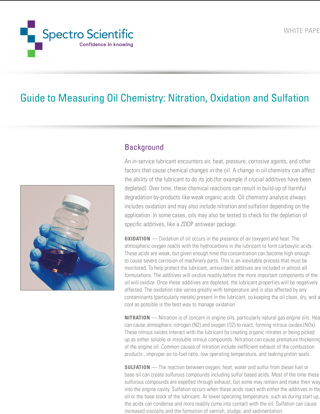
An in-service lubricant encounters air, heat, pressure, corrosive agents, and other
factors that cause chemical changes in the oil. A change in oil chemistry can affect
the ability of the lubricant to do its job (for example if crucial additives have been
depleted). Over time, these chemical reactions can result in build-up of harmful
degradation by-products like weak organic acids. Oil chemistry analysis always
includes oxidation and may also include nitration and sulfation depending on the
application. In some cases, oils may also be tested to check for the depletion of
specific additives, like a ZDDP antiwear package.

Methods of Measuring Oil Chemistry